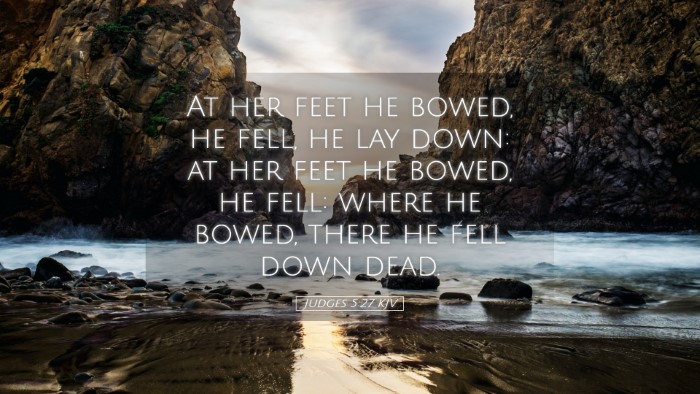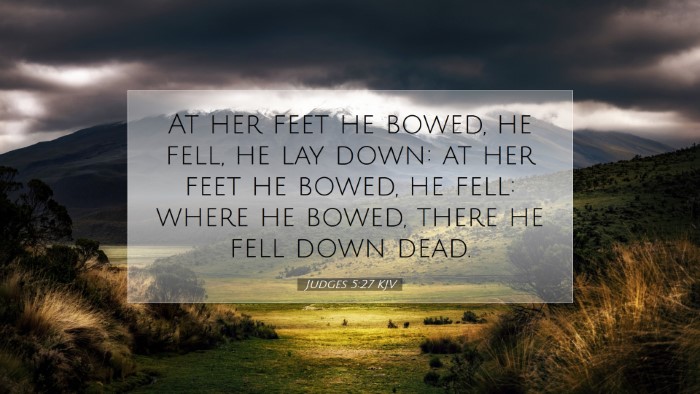Commentary on Judges 5:27
Verse Overview: Judges 5:27 presents a vivid depiction of the defeat of Sisera and his army by the hands of Deborah and Barak. In this verse, we find a poetic account of Sisera's mother's anguish as she waits for her son, a powerful image of both hope and despair.
Historical Context
The Book of Judges describes a turbulent period in Israel's history after they had entered the Promised Land but before they established a monarchy. This era was marked by cycles of apostasy, oppression, and deliverance. Deborah, a prophetess and judge, led the Israelites against the Canaanite general Sisera, who had cruelly oppressed them. Judges 5, known as the Song of Deborah, celebrates God's deliverance and vividly contrasts the faithfulness of God with the despair of the oppressors.
Literary Structure
This verse is part of a larger poetic narrative that employs rich imagery and parallelism characteristic of Hebrew poetry. The structure invites readers to feel the emotional states of both the victors and the vanquished.
Commentary Insights
Matthew Henry's Commentary
Matthew Henry emphasizes the personal tragedy experienced by Sisera's mother as she waits for her son to return from battle. His absence symbolizes not only his death but also the final defeat of the Canaanite forces. Henry points out that her anxious waiting reflects human nature's tendency to hope against hope and the communal loss felt in the wake of defeat. This scene highlights the overarching theme of divine judgment against idolaters and oppressors.
Albert Barnes' Notes
Albert Barnes offers insights into the psychological and emotional dimensions of the verse. He explains how Sisera's mother's thoughts showcase the agony of separation and anticipation for something that will not come. He draws parallels with our own expectations in life, noting that not all expectations lead to fulfillment. Barnes stresses the importance of the divine intervention that leads to the downfall of evil, illustrating God's sovereignty in the affairs of men.
Adam Clarke's Commentary
Adam Clarke focuses on the poetic style of this verse, noting how it captures the despair of Sisera's mother while juxtaposing it against the triumphant tone of the surrounding text. Clarke highlights that the imagery here serves to deepen the reader's understanding of the consequences of opposing God's will and the ultimate futility of the Canaanite oppression. The pain of a mother waiting in vain serves as a metaphor for the devastation of idolatry and moral corruption.
Theological Implications
Divine Justice: This verse starkly illustrates the notion of divine justice. It reminds readers that God’s deliverance often comes at a great personal cost to those who oppose Him.
The Role of Women: The song itself celebrates the role of Deborah, a strong female leader in a patriarchal society. It suggests that God can raise up leaders from unexpected places to fulfill His mission.
The Pain of Loss: Sisera's mother's experience invokes a deep sympathy and serves as a cautionary tale of misplaced trust in worldly powers. It foreshadows the empty promises of rulers who oppose God’s anointed ones.
Application for Modern Readers
- Trust in God: Just as Sisera's mother waits in vain for his return, modern believers are reminded not to place their faith in temporal powers but rather in God, who ultimately delivers justice.
- Theme of Hope: The Song of Deborah encourages us not only to rejoice in victories but also to mourn losses appropriately, reflecting on the lives affected by conflict.
- Leadership: The role of Deborah reinforces the significance of women in leadership within the church and community, reminding us that God equips and calls leaders regardless of gender.
Conclusion
Judges 5:27 serves as a poignant reminder of the human experiences associated with war, loss, and hope. Drawing from historical context and insights from key commentaries, this verse highlights the dual themes of divine justice and the tragic outcomes of human conflict. For pastors, students, and theologians, it presents an opportunity to reflect on God’s sovereignty, the nature of true leadership, and the fragile state of human expectation in the face of divine purpose.


